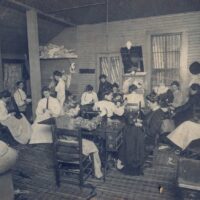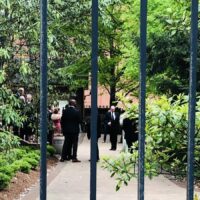A group that opposes Jennie Stuart Medical Center’s acquisition by Deaconess Health in Evansville, Indiana, is seeking a court injunction to “pause the transaction.”
Save Jennie Stuart filed a lawsuit Friday in Christian Circuit Court that names the Hopkinsville hospital and each of its 11 board members as defendants. The plaintiffs believe Jennie Stuart’s Board of Directors is scheduled to vote on the Deaconess deal on Dec. 19, the lawsuit states.
The lawsuit, which represents one side of the dispute, is described as a “derivative action” against the hospital’s governing board.
A derivative lawsuit is a type of legal action in which shareholders of a company file suit against the company’s directors on behalf of the company itself. Typically it means the plaintiff does not seek compensation to recover damages. Rather, the plaintiff sues to protect the company from financial loss or other harm.
Save Jennie Stuart, which incorporated in early October, is made up of several former Jennie Stuart board members, including five former board chairmen, and a majority of the current Jennie Stuart Foundation Board, along with Christian County Judge-Executive Jerry Gilliam and former Hopkinsville mayors Dan Kemp and Wendell Lynch.
“The decision to file suit was made after a careful investigation of the value of Jennie Stuart [Medical Center] as shown in publicly available documents and in consultation with knowledgeable financial experts,” representatives of Save Jennie Stuart said in a statement issued the day after the lawsuit was filed. “The complaint alleges that the fair market value of Jennie Stuart is substantial and the Jennie Stuart Board has breached its fiduciary duties to the hospital by agreeing to essentially transfer the hospital and all of its assets to Deaconess without sufficient consideration coming back to the community.”
The hospital board also issued a statement, defending its “comprehensive process” to evaluate options for Jennie Stuart’s future.
“We are focused every day on putting our patients, caregivers and our community first as we work to support a stronger and better Jennie Stuart,” the hospital board said in their statement. “It’s incredibly disappointing that this group has decided to pursue a wasteful and meritless lawsuit, which potentially puts the benefits Jennie Stuart patients would receive at risk, instead of working with us to give our community the health system we all deserve.”
Save Jennie Stuart is represented by Benjamin J. Lewis, an attorney with Dentons Bingham Greenebaum in Louisville.
The lawsuit has been assigned to Division I of Christian Circuit Court, where Judge Andrew Self presides.
- SUPPORT US: Like what we do? Consider making a donation to the Hoptown Chronicle, a nonprofit news organization
The plaintiffs are requesting “a restraining order, preliminary injunction and permanent injunction” to prevent the hospital from executing the Deaconess transaction.
Jennie Stuart’s board announced on Sept. 23 that it had signed a letter of intent to join Deaconess. A change in the local hospital’s ownership had been under review for several months before it became public. Proponents of the Deaconess acquisition have said it is a strategic move in the best interest of protecting Jennie Stuart’s long-term viability. Opponents say it will diminish local control of the community-based, not-for-profit hospital.
The plaintiffs, who estimate the hospital has a “book value” exceeding $157 million, are critical of the hospital board’s use of a four-person subcommittee to largely handle the details of a transaction between Jennie Stuart and Deaconess.
“Despite being a highly valuable community asset, the Subcommittee and other members of the Governing Board intend to give the Hospital enterprise, including its valuable cash and real estate, to Deaconess for virtually nothing in return,” the lawsuit states.
“… The Proposed Transaction suffers from numerous fundamental flaws including, but not limited to, the non-disclosure of material information to the full Governing Board and other key decision makers;the lack of a valuation to inform the Governing Board as to the value of the assets that Deaconess would receive in the Proposed Transaction; the presence of disqualifying conflicts of interest amongst the Governing Board; and a willful failure to consider common sense alternatives to the Proposed Transaction. The Proposed Transaction is the result of an inexplicably rushed, exclusionary process spearheaded by the Subcommittee — whose members possess little-to-no experience navigating mergers and acquisitions of this kind.”
Save Jennie Stuart says in its lawsuit that the hospital is still “thriving” financially, and the group questions whether the entire hospital board fully understands the hospital’s financial condition. It says the hospital board “failed to procure and study a valuation of the Hospital, before negotiating to give the Hospital to Deaconess for virtually nothing in return.”
At a community meeting the hospital hosted, and in other forms of communication, Jennie Stuart representatives have acknowledged that the hospital is experiencing major problems with billing and related business operations through its EHR [electronic health records] platform. These issues led the hospital to consider broader partnership with other hospital groups. If Deaconess acquires Jennie Stuart, it will implement the highly regarded Epic-brand EHR system at Jennie Stuart, local officials have said.
Save Jennie Stuart’s leadership includes Theresa Nichol, as president, Dan Kemp, vice president, and Darrell Gustafson, secretary-treasurer.
Jennie Stuart’s board chair is Leslie Carroll. The vice chair is Hollis White.
Read all of Hoptown Chronicle’s coverage of Jennie Stuart and Deaconess here.
Jennifer P. Brown is co-founder, publisher and editor of Hoptown Chronicle. You can reach her at editor@hoptownchronicle.org. Brown was a reporter and editor at the Kentucky New Era, where she worked for 30 years. She is a co-chair of the national advisory board to the Institute for Rural Journalism and Community Issues, governing board past president for the Kentucky Historical Society, and co-founder of the Kentucky Open Government Coalition. She serves on the Hopkinsville History Foundation's board.





